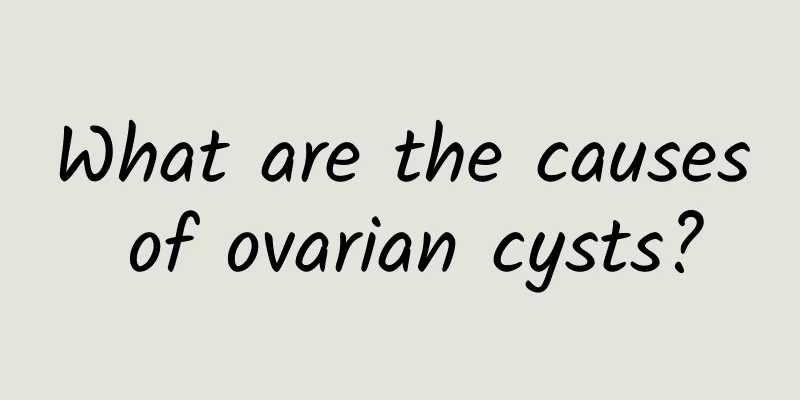Why do uterine fibroids sometimes disappear?

|
Why do uterine fibroids sometimes disappear? Uterine fibroids, also known as uterine myoma lesions, are one of the common benign tumors of the female reproductive system. However, in some cases, uterine fibroids may decrease or even disappear, which arouses people's curiosity: Why do uterine fibroids sometimes disappear? This article will analyze from several aspects to help readers better understand this phenomenon. Formation and growth of uterine fibroids Uterine fibroids are tumors formed by the ectopic growth of uterine smooth muscle tissue. Their formation and growth are affected by many factors. According to research, estrogen is one of the main factors in the growth of uterine fibroids. Therefore, in theory, when the estrogen level in the body decreases, the growth of uterine fibroids may slow down or even stop. The impact of hormone levels The hormone level in the human body is one of the keys to maintaining normal body functions, and the secretion of estrogen plays an important regulatory role in the female reproductive system. However, when the hormone level is affected by some external factors, it may also hinder the growth of uterine fibroids. The level of progesterone increases as pregnancy progresses. High levels of progesterone can inhibit the growth of uterine fibroids, so uterine fibroids may shrink or even disappear during pregnancy. This is why some women find that their uterine fibroids shrink after pregnancy. The onset of menopause causes a drop in estrogen levels. As women age, the secretion of estrogen in their bodies gradually decreases, which has a certain inhibitory effect on the growth of uterine fibroids. Therefore, some women may find that their uterine fibroids shrink or even disappear during menopause. The role of environmental factors Environmental factors also play a role in the growth and development of uterine fibroids. Studies have shown that environmental factors such as diet and lifestyle may affect estrogen levels, which in turn may have an impact on the growth of uterine fibroids. A diet rich in hormones, such as meat and dairy products, may increase estrogen levels, thereby stimulating the growth of uterine fibroids. A healthy diet, such as consuming fiber-rich foods such as fruits and vegetables, can help maintain a good hormone balance and slow the growth of uterine fibroids. Certain lifestyle habits, such as quitting smoking, reducing alcohol intake, and maintaining moderate exercise, can also help maintain good health and hormonal balance and reduce the development of uterine fibroids. Effects of medical treatment The last reason is the effect of medical treatment. For women diagnosed with uterine fibroids, doctors may prescribe medication or surgery. Medication can prevent the growth of uterine fibroids by inhibiting the secretion of estrogen or adjusting hormone levels. Surgical treatment is to remove uterine fibroids through surgery to eliminate the tumor fundamentally. Therefore, if surgical treatment or drug treatment achieves good results, uterine fibroids will gradually decrease or even disappear. Why do uterine fibroids sometimes disappear? This is due to a combination of factors. Hormone levels, environmental factors, and the effects of medical treatment may all have an impact on the growth of uterine fibroids. However, it should be noted that the reduction or disappearance of uterine fibroids does not mean complete recovery. Regular check-ups and communication with doctors are still required to seek the best treatment plan. |
<<: Why do uterine fibroids sometimes not grow? Why do some uterine fibroids not grow?
Recommend
6 reasons for raising a fat child - easy self-diagnosis
Mingming, 7 years old, has loved fried food and h...
Traditional Chinese medicine helped her get rid of cervicitis
40-year-old sister Wang is a very enthusiastic pe...
What are the dangers of biochemical abortion? What should I do if I have a biochemical pregnancy?
Pregnancy is a very important thing for women. On...
Experts teach you how to correctly diagnose cervical hypertrophy
Every patient should know about the diagnosis of ...
1 minute of aerobic exercise! Burn calories and lose fat easily
After doing 1 set of 3 sets of main lower body ex...
3 minutes in 1 day! Squats have these 3 benefits, private squat weight loss method to let you know
Every girl has been fighting against "weight...
What should I do if my menstruation is irregular after having an IUD inserted?
What should I do if my menstruation is irregular ...
What are the symptoms of female cervical erosion? Can female cervical erosion heal itself?
What are the symptoms and phenomena of cervical e...
Can amenorrhea be cured?
There are currently three main methods for treati...
What can I drink to relieve menstrual pain
What can I drink to relieve menstrual pain? Durin...
How to treat a cold and cough? Can honey water relieve cough? Drink honey water and master the 4 key best times
After the Chinese New Year, a large number of pat...
A waist that is too thick may increase the risk of metabolic syndrome! 4 tips to protect your waistline, slim waist and win big prizes
A waist that is too thick may increase the risk o...
How to treat pelvic effusion completely
I often had unbearable back pain, so I went to se...
Is cervical erosion moderately serious? Do I need to take medicine?
Moderate cervical erosion is usually not a very s...
Can eating spicy hotpot help you lose weight? Famous weight loss doctor: The fattest and most greasy ones are here...
In winter, people want to nourish themselves but ...









